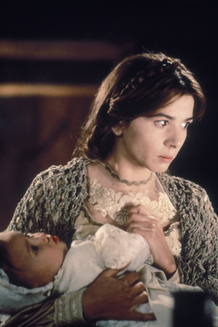
Literature and cinema are two
different tools to drill holes through the same wall, so to speak.
If we place a television set on that wall, one might make use of
cinema and literature as if they were the same tool.
Something similar occurs when that
peculiar genre known as a television series is placed in the hands
of someone like myself.
Because today, literature is in the
eye of the beholder while film, looking at it from that point of
view, is no longer just images. It is also gazing. And a television
series like "Los Pazos de Ulloa" is also and above all, cinema.
About these and other matters I would like to talk with the author
of the book. However, as she is no longer alive, I invoke and
summon the spirit of Emilia Pardo Bazán, for that purpose.
She doesn't show up, but instead
the telephone rings. It isn't her, but a female journalist with a
cold, by the sound of her voice. "Mr. Suarez?", she inquires in a
sickly sweet tone. And soon enough she asks me what I think about
the series I have just finished filming. In fact, not only that,
she also wants to know my opinion of Pardo Bazán's book, the screen
adaptation of literary works in general, and about Spanish
Television (TVE) in particular. As if that weren't enough, she
wants me to tell her the details of the budget, and whether the
actors speak with a Galician accent, and if I agree with the law
promoted by Pilar Miró in her capacity as Minister of Culture
regarding subsidies for the film industry, and why the latest
Spanish movies haven't been successful, and if I am against Spain
joining NATO, and what is the difference between a series and a
film, and if I'm not worried that with so many screen adaptations
of books, Spaniards might stop reading (sic), all of which doesn't
prevent her from confessing that she hasn't read Pardo Bazán's
books. Well, in fact she has read something but very little and
that was years ago and she doesn't remember. She also wants me to
give to her the technical specifications of the series; she had
them but lost them. And when I start telling her about Gerardo
Vera's set decorations, Carlos Suárez's photography and the very
remarkable performance of José Luis Gómez, she interrupts me and
blurts out the most insidious insinuation I can possibly imagine:
"So then, are you happy?"
Well, in fact, I am happy. I hang
up the phone and that is the main reason why I'm happy.
And then what must happen actually
happens: Emilia Pardo Bazán appears before me and sits on my lap.
She isn't exactly an ethereal ghost because she weighs...and a hell
of a lot at that. She whispers in my ear: "You're an out-and-out
hypocrite". Mind you, she says it without resentment. In fact I'd
say she even says it with shameful tenderness.

"How could you possibly try to
convince them," says she, "that during the 16 weeks of filming, you
were thinking about me when you were flippantly tossing me around
this way and that way in keeping with your disgraceful instincts?
Did you honestly do it to contribute towards reviving memories
about me?"
A strident outburst of laughter
almost shatters my eardrum.
"You hypocrite!" she exclaims. "It
was I who was thinking about you! And I said to myself, 'Let's let
him do whatever he wants to do. After all he'll only do what he can
do.'"
"And I was able to do it," I reply
with clumsy pride.
"Oh, yes!" she concedes. "Don't you
think I'm going to come out now with stinging and prideful comments
as an author. On occasions like this, my dear Gonzalo, we writers
are better being dead. It's the healthiest attitude."
Well, thank you," I answer with
ineffable sincerity," and my legs gradually go numb under the
invasive weight of my deceased colleague's buttocks.
"But, do you really think that
everything I wrote would have any value today if somebody didn't
revive it through those little TV boxes?" she inquires with sudden
and demolishing shrewdness. I remain silent. It isn't necessary to
reply. She does it herself and bluntly at that. "It only depends on
the degree of intensity one puts on it," she says, and then
disappears. But she reappears soon enough.
"If you have obtained any results,"
she warns me, "don't brag about it, for you have achieved it with
good allies at your side."
And this time, she disappears for
good. I am relieved. All I can add is that good stories are
sometimes culture, and culture is always entropy. When you apply an
adequate load to a specific story, the narration might acquire the
relative appearance of life and replace, through the evidence it
brings, the other fiction of four walls that we call reality.
And when something like that
happens on TV, looking at it isn't enough. It is also advisable to
see it.
GONZALO SUÁREZ.